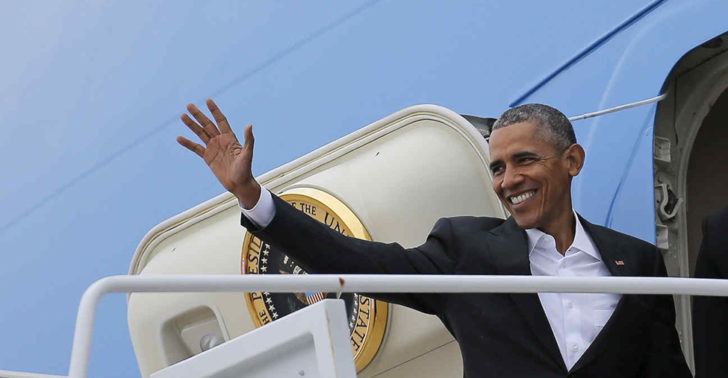
Obama’s farewell to Cuba
HAVANA — Barely one week before the end of his mandate, it seems that President Obama has concluded his policy of reforms in relations with Cuba with the acceptance of a new migratory accord that eliminates the dry-foot-wet-foot policy, and the Parole Program for Cuban doctors who collaborate in third countries.
He has also established new guidelines intended to normalize migratory procedures between the two countries.
Within the agenda of negotiations begun on Dec. 14, 2014, such migratory problems were included in the list of issues where “no consensus existed between the parties” yet were “essential” to Cuba. Therefore, their solution constitutes a relevant triumph of Cuban diplomacy, even though their functionality for the United States was evidently scant.
This is, therefore, an important step in the process of normalization of relations and basically resolves the problem of the exceptional treatment of U.S. policy toward Cuba’s illegal emigration, the cause of constant tension for more than half a century.
Although the Cuban party has reiterated that the elimination by the U.S. Congress of the Cuban Adjustment Act constitutes another indispensable ingredient for a full normalization of migratory links, in practice, deprived of the regulations that linked it to illegal emigration, this law has lost the essence of its negative impact and has become basically a domestic problem for the United States.
With these decisions, a good many of the privileges resulting from the alleged “exceptionality” of the Cuban migrants have been eliminated. Among them is the possibility that they may be repatriated to Cuba, for which diverse instruments and categories were established.
The most important factor in this sense is that it posits a different political climate, inasmuch as these privileges were associated with the destabilizing policies of the U.S. government against Cuba.
It is also the objective result of the transformations that have occurred in the Cuban-American community, which have made ineffective for the U.S. the use of emigration with these objectives.
Nevertheless, with some logic, some analysts consider that this new scenario will not be exempt from problems for both countries.
In the case of Cuba, an alternative for those who wish to emigrate and are not accepted legally by the United States has been eliminated, which may originate tension inside Cuban society, because that alternative was accepted by the popular culture as a way to solve economic problems or to seek other existential options.
As to the United States, it will have to face the reaction on its borders of people who until now had been admitted indiscriminately. It will have to deal with the existence of illegal Cuban immigrants in its territory whom it will have to persecute and deport, as it does with the rest of the irregular immigrants. That will provoke adverse attitudes on the part of the Cuban-American community and other sectors of U.S. society.
Right now, there are hundreds of Cuban emigrants en route toward the United States. Under the new U.S. policy, the border authorities most likely will limit themselves to reject them, handing the problem to the transit countries and to Cuba, which will have to negotiate with those countries a humanitarian solution for these cases.
The treatment given in the recent past by Cuba to this type of migrant indicates the commitment of Cuban policy to this issue but, even so, we can predict the existence of complications that will not have an easy solution.
Nevertheless, whatever the unwanted effects might be, what’s most important is the stability of a process aimed at achieving a regular, orderly and safe migratory flow between the two countries.
What’s essential is a beneficial result for both societies, the potential collateral victims of the dangers that chaos might bring, as well as for the migrants themselves. Such a beneficial outcome is an unshirkable responsibility for both states.
The two countries made a commitment to review their migratory policies to meet the terms of the accords.
As to the United States, it will be interesting to see what treatment will be given to the Cubans who enter the country legally, on a temporary basis, and decide to remain permanently in the country. Until now, they’ve been able to do so automatically and enjoy a series of benefits before seeking shelter under the Cuban Adjustment Act after one year in-country.
Beginning now, we may suppose that a judicial decision will be called for, although the rigor of its implementation will depend on the influence of the previous precedent in the judges’ ruling.
As regards Cuba, the decision is more transcendental. One of the ways to placate adverse reactions to these accords and attenuate its negative domestic effects is precisely to update the migratory policy by facilitating the émigrés’ contacts with Cuban society and promoting their existential ties to the island.
The Cuban government has vowed to do this gradually, although it may be sensible to speed up the adoption of measures that have been awaiting implementation for years and respond to realities that are plain to see.
Finally, the elimination of the Parole Program for Cuban doctors who work in third countries facilitates the collaboration of Cuba and the United States in humanitarian projects at an international scale and constitutes a measure whose fundamental political reach is to contradict a logic of the confrontation, which on occasion has reached levels of irrationality impossible to justify on an ethical plane, regardless of the existing political differences.
We should assume that Donald Trump is in agreement with these accords. Actually, he inherits a problem that’s already solved and the accords match his discourse about limiting illegal immigration to the U.S. But, like any other element of bilateral relations, good will is needed to apply them. We’ll see then what his conduct will be in this regard.
In any case, the United States and Cuba have established the precedent that it is possible to negotiate and find points of agreement even in problems that have accumulated over years, where consensus seemed impossible.

